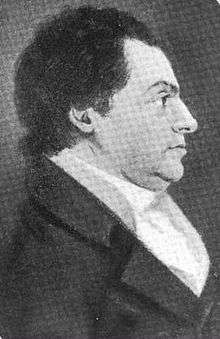Philip S. Van Rensselaer
| Philip S. Van Rensselaer | |
|---|---|
 | |
| Mayor of Albany, New York | |
|
In office 1819–1820 | |
| Preceded by | Elisha Jenkins |
| Succeeded by | Charles E. Dudley |
|
In office 1799–1816 | |
| Preceded by | Abraham Ten Broeck |
| Succeeded by | Elisha Jenkins |
| Personal details | |
| Born |
Philip Schuyler Van Rensselaer April 15, 1767 Albany, Province of New York |
| Died |
September 25, 1824 (aged 57) Albany, New York |
| Spouse(s) |
Anne De Peyster Van Cortlandt (m. 1787; his death 1824) |
| Relations |
Stephen Van Rensselaer III (brother) Abraham Ten Broeck (uncle) Rensselaer Westerlo (half-brother) Philip Livingston (grandfather) Pierre Van Cortlandt (father-in-law) |
| Parents |
Stephen Van Rensselaer II Catharine Livingston |
Philip Schuyler Van Rensselaer (April 15, 1767 – September 25, 1824) was the Mayor of Albany, New York on two occasions. He has the third longest tenure of service by an Albany Mayor, after Erastus Corning II and Gerald Jennings.
Life and career
Philip S. Van Rensselaer was born in Albany on April 15, 1767. A son of Stephen Van Rensselaer II (1742–1769) and Catharina (or Catharine) Livingston (1745–1810), he was raised and educated at Van Rensselaer Manor. After his father's death his mother married Eilardus Westerlo (1738–1790), a member of another prominent Albany area family.[1][2]
He was the brother of Stephen Van Rensselaer III (1764–1839) and the grandson of Philip Livingston (1716–1778). Abraham Ten Broeck (1734–1810) was his uncle. Rensselaer Westerlo (1776–1851) was his half-brother.
Career
As an adult, Van Rensselaer lived in Albany and became a successful businessman and banker. Among his activities, he was the President of the Bank of Albany,[3] a Trustee of Union College,[4] and a founder of The Albany Academy.[5] He owned several warehouses, extensive land along Albany's Hudson River waterfront, and flour and plaster mills on the Normans Kill at the Bethlehem town line. His mills were destroyed by fire in 1820.[6]
In 1793 Van Rensselaer became an Alderman.[7] He served as Mayor from 1799 to 1816, and was succeeded by Elisha Jenkins. Van Rensselaer returned to office from 1819 to 1820, and was succeeded by Charles E. Dudley.[8][9]
During his time as Mayor, a permanent New York State Capitol building was constructed just in front of the current one, and Van Rensselaer laid the cornerstone.[10] During his term, Robert Fulton's steamboat Clermont arrived in Albany at the end of its first voyage,[11] and Schenectady County was created from a portion of Albany County.[12]
Van Rensselaer was active as a Freemason, and served as New York's Grand Master from 1793 to 1795.[13]
Personal life
In 1787, he married Anne De Peyster Van Cortlandt (1766–1855), a distant cousin through the Schuyler family, daughter of Pierre Van Cortlandt, descendant of Mayor of New York City Stephanus Van Cortlandt, and sister of Philip Van Cortlandt and Pierre Van Cortlandt, Jr. They had no children.[14][15]
He died in Albany on September 25, 1824. He was buried at Van Rensselaer Manor, and was later reinterred at Albany Rural Cemetery.[16]
References
- ↑ Robert Schultz, Masters of New York, 2010, page 141
- ↑ Publishing Society of New York, Monsieur Bossu's Treatise of the Epick Poem, 1907, page 23
- ↑ The American Historical Magazine, The Van Rensselaer Family, Volume 2, January, 1907, page 23
- ↑ Union College, General Catalogue, 1854, page 6
- ↑ Arthur James Weise, The History of the City of Albany, 1884, page 452
- ↑ Joel Munsell, The Annals of Albany, Volume 7, 1856, page 142
- ↑ Stefan Bielinski, New York State Museum, Biography, Philip S. Van Rensselaer, accessed January 4, 2013
- ↑ Joseph Henry, Nathan Reingold, The Papers of Joseph Henry, Volume 1, 1972, page 8
- ↑ Joel Munsell, The Albany annual register for 1849-1850, Part 2, page 208
- ↑ Architectural Record Co., Architectural Record, Volume 9, 1900, page 145
- ↑ Richard Dilworth, Cities in American Political History, 2011, page 129
- ↑ Joel Munsell, The Annals of Albany, Volume 5, 1854, page 25
- ↑ Grand Lodge of the State of New York, Annual Meeting Proceedings, 1902, page 107
- ↑ Silas Constant, Emily Warren Roebling, The Journal of the Reverend Silas Constant, 1903, page 430
- ↑ Colonial Dames of New York, Genealogical Records: Manuscript Entries of Births, Deaths and Marriages Taken From Family Bibles, 1581-1917, 1917, page C-256
- ↑ Cuyler Reynolds, Albany Chronicles, 1906, page 390
External links
- Hudson-Mohawk Genealogical and Family Memoirs: Van Rensselaer
- A Guide to the Papers of Angelica Schuyler Church – University of Virginia Library